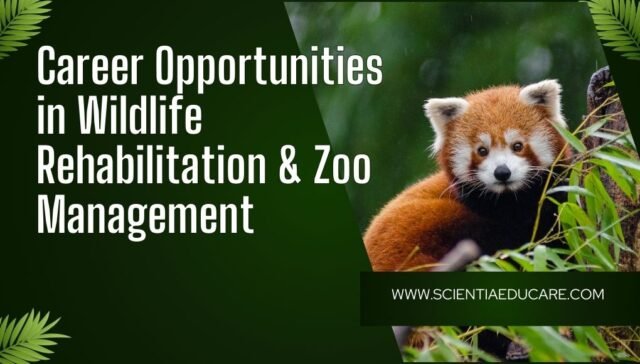Pursuing a career in wildlife rehabilitation and zoo management offers a unique opportunity to contribute to the conservation and well-being of animal species worldwide. This field combines passion for animals with scientific knowledge and management skills to ensure the health and sustainability of wildlife populations.
Entry-level wildlife rehabilitation jobs,
Zoo management degree programs,
Wildlife rehabilitation certification courses,
Non-profit wildlife rescue careers,
Zoo curator job openings
Table of Contents
- Understanding Wildlife Rehabilitation
- Exploring Zoo Management
- Educational Pathways
- Career Opportunities
- Top Institutions Offering Relevant Programs
- Further Reading
Understanding Wildlife Rehabilitation
Wildlife rehabilitation involves the treatment and care of injured, sick, or orphaned wild animals with the goal of releasing them back into their natural habitats. Rehabilitators work to ensure that animals regain their health and are capable of independent survival.
Key Responsibilities:
- Assessing injuries and illnesses in wildlife.
- Providing medical care and therapy.
- Developing rehabilitation plans tailored to individual species.
- Educating the public on wildlife conservation and safety.
Professionals in this field often collaborate with veterinarians, conservationists, and government agencies to promote wildlife health and conservation.
Exploring Zoo Management
Zoo management encompasses the administration and operation of zoological parks, focusing on animal care, conservation, education, and research. Managers ensure that zoos provide safe, enriching environments for animals and informative experiences for visitors.
Key Responsibilities:
- Overseeing daily operations and staff management.
- Ensuring compliance with animal welfare regulations.
- Developing and implementing conservation programs.
- Managing budgets and fundraising initiatives.
Effective zoo management requires a balance of business acumen, leadership skills, and a deep understanding of animal behavior and welfare.
Educational Pathways
A solid educational foundation is crucial for a successful career in wildlife rehabilitation and zoo management. Relevant fields of study include:
- Wildlife Biology: Focuses on the study of wild animals and their ecosystems.
- Zoology: The scientific study of animal behavior, structure, physiology, and classification.
- Animal Science: Covers the biology of animals under human control, such as livestock and pets, and can be applied to wildlife.
- Conservation Biology: Emphasizes the protection and management of biodiversity.
Advanced degrees may be required for higher-level positions, particularly in research or academia. Practical experience through internships, volunteering, or part-time positions is highly valuable. Organizations like the National Wildlife Rehabilitators Association offer resources for gaining experience in this field.
Career Opportunities
The field offers diverse career paths across the globe. Here are some notable opportunities:
1. Wildlife Rehabilitation Specialist
- Description: Provide medical care and rehabilitation to injured or orphaned wildlife.
- Potential Employers: Non-profit rehabilitation centers, government wildlife agencies, and zoos.
- Job Listings: Explore current openings on Indeed.
2. Zoo Curator
- Description: Oversee specific animal collections, manage staff, and develop educational programs.
- Potential Employers: Accredited zoos and aquariums.
- Job Listings: Check opportunities on the Association of Zoos and Aquariums (AZA) Job Board.
3. Conservation Program Manager
- Description: Develop and manage programs aimed at wildlife conservation and habitat preservation.
- Potential Employers: Non-governmental organizations (NGOs), government agencies, and international conservation groups.
- Job Listings: Positions are often listed on Conservation Job Boards.
4. Wildlife Educator
- Description: Create and deliver educational content to inform the public about wildlife conservation.
- Potential Employers: Zoos, museums, nature centers, and educational institutions.
- Job Listings: Explore roles on AZA’s Job Board.
5. Animal Care Manager
- Description: Supervise animal care staff, develop care protocols, and ensure the well-being of animals in captivity.
- Potential Employers: Zoos, aquariums, and wildlife sanctuaries.
- Job Listings: Find opportunities on AZA’s Job Board.
Top Institutions Offering Relevant Programs
Several universities and colleges worldwide offer specialized programs in wildlife rehabilitation, zoo management, and related fields. Here are some notable institutions:
1. University of California, Davis (USA)
- Program: Bachelor of Science in Wildlife, Fish, and Conservation Biology.
- Website: https://www.ucdavis.edu/majors/wildlife-fish-and-conservation-biology
2. University of Florida (USA)
- Program: Bachelor of Science in Zoology.
- Website: https://biology.ufl.edu/undergraduate/zoology-major/
3. University of Plymouth (UK)
- Program: Master of Science in Zoo Conservation Biology.
- Website: [https://www.ply














